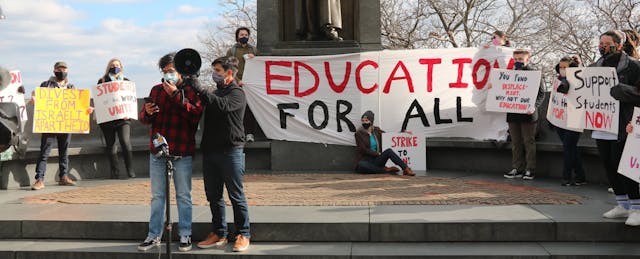Students have been pushing universities to slash tuition since the beginning of the pandemic. At some campuses, students organized tuition strikes. Others decided to sue.
EdSurge decided to look at how those efforts have played out. Here are some highlights.
Many Lawsuits Have Fizzled
One running list documented 240 tuition refund lawsuits filed last year. But judges are ruling that students don’t have a leg to stand on. Just this week, a U.S. District Court judge in Massachusetts threw out a case against Harvard University after finding students had no evidence they were promised in-person classes, Reuters reports.
That seems par for the course, including at:
- University of the Pacific, which had been in court since last May. The “unjust enrichment” case was dismissed with prejudice this month.
- Brown University, along with three other Rhode Island institutions, which dodged a class-action breach-of-contract lawsuit when it was dismissed in March.
- Texas A&M System, where plaintiffs voluntarily dropped a class-action lawsuit in November.
“At this point, it seems like most lawsuits have been thrown out before they’ve gone to court or before they’ve gone to a jury,” says Robert Kelchen, who chairs the Department of Education Leadership, Management and Policy at Seton Hall University. “It seems like the rationale for that is [COVID-19] was an unforeseen circumstance, and students still got the main thing they were paying for, which was the credits.”
Judges are hesitant to weigh in on the quality of online classes compared to in-person instruction, Kelchen says, given the far-reaching consequences they could have.
“It might potentially affect how much colleges can charge for online degrees going forward if there’s precedent saying, ‘Courts say they’re less valuable,’” he says, adding such a stigma could dissuade students from enrolling in online programs.
That’s not to say that every case has been stymied, and Kelchen notes that courts are still catching up on the pandemic backlog. A judge in the Southern District of Florida is allowing lawsuits against the University of Miami to proceed. South New Hampshire University agreed to pay nearly $1.3 million to settle the class-action case it was facing, and Columbia University is settling with students over fees.
Tuition Strikes Are Sticking Around
Anna Attie graduated the same semester she founded UChicago for Fair Tuition in spring 2020, when about 200 students held a tuition strike. While University of Chicago leadership never met with students over their demands of a tuition reduction, Attie counts the university’s 2021-22 tuition freeze as a victory一even it was a short-lived one. A bigger win was the community of students who reached out to her about organizing tuition strikes at their own universities, she says.
“We saw this as something we could put on the map as a tactic students can use to take back power and have a say in what happens at their universities,” Attie says. “The goal was for this to become about more than just tuition and the University of Chicago. All of the movements we see at universities, they’re all connected even if organizers aren’t talking to each other, which they often are. They’re all about redistributing the power of the university.”
Other campuses where students organized similar tuition strikes are:
- Columbia University
- New York University
- Vassar College
About 1,000 Columbia University students withheld their tuition payments this semester. They and another 4,500 supporters demanded that the university reduce the cost of attendance by at least 10 percent and increase financial aid by the same figure, along with a slew of community and transparency initiatives.
“This was not just a strike about classes being online or students being upset that they had to pay full tuition,” says Townesend Nelson, who helped organize the strike as co-chair of Columbia-Barnard Young Democratic Socialists of America. “This was catalyzed by the pandemic, but there were a host of issues that students had been trying to address for many, many years.”
While the students voted to end their semester-long tuition strike in April, Nelson views it as a success. The university announced in January that it would divest from fossil fuels, one of strikers’ demands, and announced a plan to raise $1.4 billion for financial aid days after the strike ended.
“I think it was motivated by that general desire for students to reshape the direction higher education is taking, and I think Columbia is just the tip of the spear in this regard,” Nelson says. “Tuition only gets more and more expensive, students’ education gets more commodified, everything just becomes this hollow transaction where there is little of what we want education to exemplify: the good traits of humanity.”
It looks like Attie and her former classmates will have the lasting impact they wanted. Inspired by UChicago for Fair Tuition, Vassar College students are planning a tuition strike for the fall.


